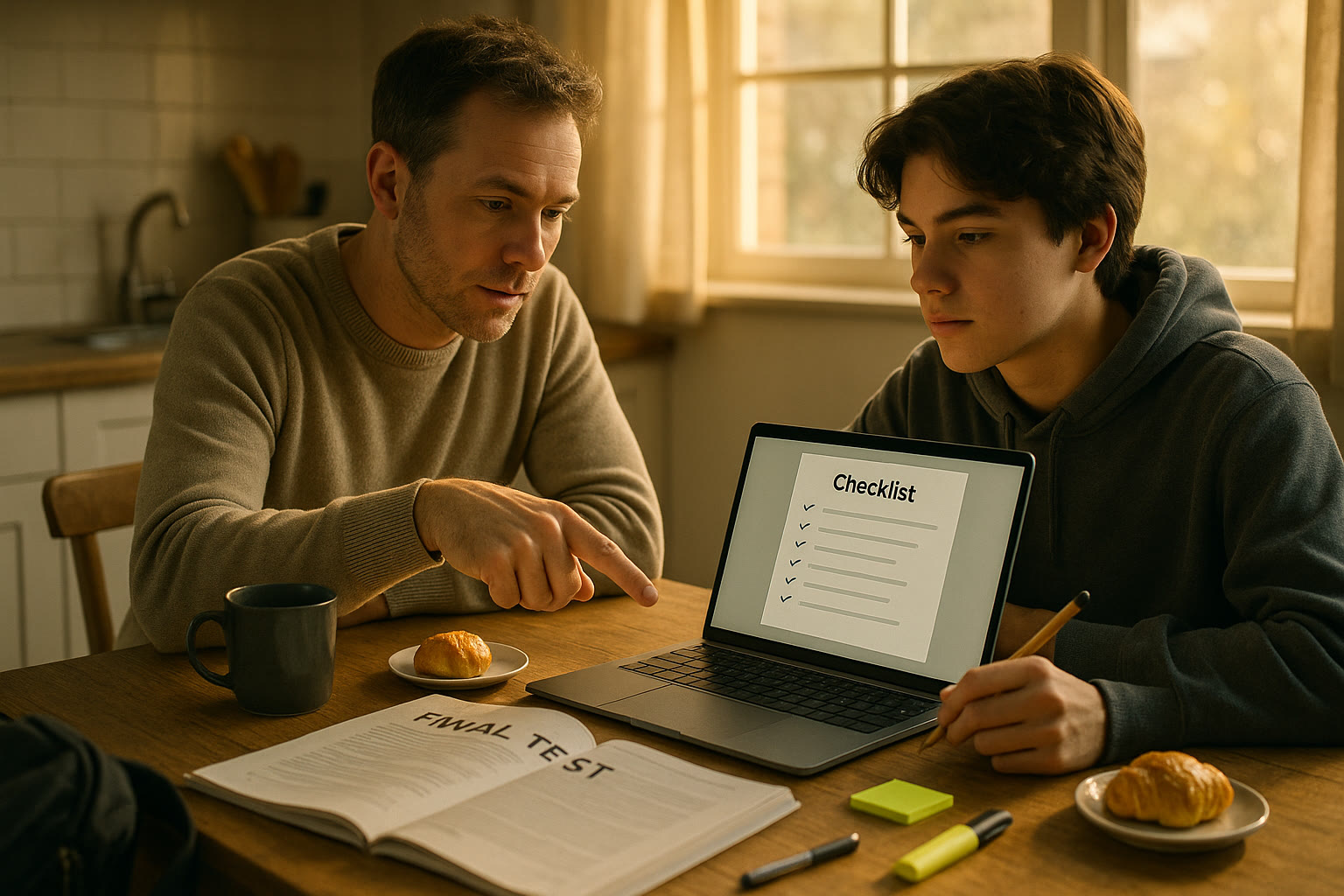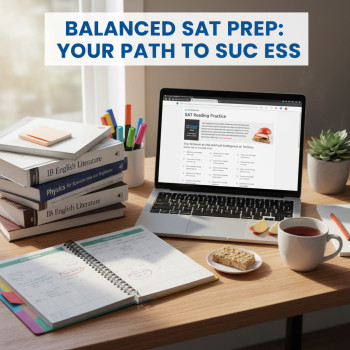Introduction: The Power of a Parent’s Words
The minutes and hours before the Digital SAT are a unique kind of delicate. For students they’re a heady mix of hope, nerves, and the faint hum of preparation still running in the background. For parents, those same hours carry the urge to do something—anything—that will help. What we say (and how we say it) matters. It can steady a shaking hand, replace a spiraling thought with a calm one, or accidentally increase pressure right when ease is needed most.
This article gives you practical, human, and ready-to-use scripts—things you can say that feel natural, warm, and effective. I’ll also share short explanations of why each phrase works, what to avoid, and small practical actions that make big differences. Along the way we’ll include checklists, a simple timeline for the morning of the exam, and a sample conversation you can adapt to your child’s age and temperament.

Why Scripts Help (Beyond the Words)
Scripts aren’t about being robotic. They’re tools that help you translate your intentions—support, calm, and encouragement—into language that lands well with a stressed teen. The best scripts do three things:
- They acknowledge feelings (so the teen feels seen).
- They reframe pressure as manageable effort (so focus replaces worry).
- They offer concrete, immediate next steps (so the teen can act, not ruminate).
Parents often want to fix anxiety with logic or to motivate with competitive pep talks. But research and experience show that validation plus a small plan creates the strongest calm. Below are scripts organized by tone and situation—choose the ones that feel authentic to you.
Before You Walk Out the Door: Short Scripts to Try
These 1–2 sentence lines are perfect for the 10–30 minute window before your teen leaves for the test. Say them quietly, with steady eye contact, and without expecting a long response.
- “I’m proud of how much you prepared; today is just another chance to show what you know.” — Why it helps: pairs pride with perspective.
- “Take it one question at a time; you don’t have to get everything perfect.” — Why it helps: narrows focus and lowers the stakes.
- “Breathe with me for 60 seconds—just in and out—then go in with clear focus.” — Why it helps: reduces immediate physiological symptoms of anxiety.
- “If anything comes up today, we’ll handle it together afterward.” — Why it helps: reinforces a safety net and reduces catastrophic thinking.
Scripts That Give a Practical Edge
Sometimes what a student needs most is a tiny tactical reminder—something that keeps the brain in check and the hands steady.
- “Start with the questions that feel familiar—build momentum.”
- “Use your break to stretch and snack—don’t talk scores or what-if scenarios during the break.”
- “If you’re unsure, mark it and move on; you can come back with fresh eyes.”
Longer Scripts: Conversations to Have the Night Before
These are short conversations you might have over dinner or after study time. They open space for questions and set an emotional tone for the test day.
- “I know you’ve worked hard. The SAT is one benchmark; it doesn’t define your whole future. We’ll celebrate your effort no matter the score.”
- “What’s worrying you most about tomorrow? Let’s break that down and make a small plan for it.”
- “Tell me one thing you feel confident about—let’s start there tomorrow.”
Why these work: they normalize the experience, allow the student to name a fear (versus letting it run silently), and make the parent a collaborator rather than a judge.

What Not to Say (and Why)
Intentions are often good; the effect can still be harmful. Here are common phrases to avoid and short reasons why.
- “This test will make or break your college chances.” — Creates catastrophic pressure and ignores the broader admissions process.
- “Just do your best—no excuses.” — Vague and can sound dismissive of real anxiety or struggles.
- “I sacrificed so much for this—don’t waste it.” — Shames rather than supports; pressure becomes personal burden.
- “If you don’t get X score, we’ll have to…” — Threats make performance anxiety worse and shift focus to fear of consequences.
Morning Checklist: Practical Items to Say (and Do)
Combine a calming script with a short physical checklist. Use this the morning of the test to keep everything concrete and under control.
| Item | Say This | Why It Helps |
|---|---|---|
| Breakfast | “Protein, fruit, and water—fuel for focus.” | Steady energy and stable blood sugar improve concentration. |
| Materials | “Wallet, test ticket, school ID, fully charged device/battery pack.” | Reduces last-minute panic and prevents forgotten items that derail focus. |
| Time | “Leave 10 minutes earlier than you think you need to.” | Buffer time reduces stress from traffic or unexpected delays. |
| Mindset | “You don’t have to shine today—you just have to do your best with what you know.” | Shifts from perfection to performance. |
Handling Anxiety: Short Exercises to Use Together
When your teen’s stomach flips or they begin to catastrophize, short, shared practices can help immediately.
- Box breathing: inhale 4 seconds, hold 4, exhale 4, hold 4—repeat 3 times.
- Grounding list: name 5 things you can see, 4 you can touch, 3 you can hear, 2 you can smell, 1 you can taste.
- Positive anchor: recall a recent success together (a test, a performance, or even a difficult day handled well) and spend 30 seconds describing it.
These techniques are simple, portable, and effective because they switch the nervous system from fight/flight to calm focus.
How to Talk About Scores After the Test
Most parents want to know results immediately; many students want space. Here’s a short script to bridge that gap.
- “When you’re ready to talk about the test and your score, I’m here. If you want time first, take it—no pressure.”
- “Scores are information, not value judgments. We’ll look at them together and decide next steps—retake, prep adjustments, or celebrating what went well.”
Framing scores as data helps reduce shame and puts the focus back on strategy. For families using extra support, this is where Sparkl’s personalized tutoring can be useful: a tutor can translate scores into a tailored plan—1-on-1 guidance, focused practice, and smart adjustments informed by AI-driven insights—without parental guesswork adding pressure.
Realistic Expectations: How Colleges View the Digital SAT
It’s important to keep the SAT in perspective. Colleges look at many parts of an application—grades, courses, essays, activities, recommendations, and test scores. A single test score is rarely the final story. Remind your student that admissions teams care most about the trajectory: consistent effort, curiosity, and evidence of improvement often matter more than any one paper or screen-based exam.
Sample Parent–Teen Script: A 5-Minute Conversation
Customize this short dialogue to your voice. It’s paced to be supportive, practical, and calming.
Parent: “Hey—quick check. You’ve got your ID, ticket, and charger, right?”
Teen: “Yes.”
Parent: “Good. I’m proud of the time you put in. Remember, start with the questions you know, breathe if you feel stuck, and move on—come back later. We’ll celebrate dinner tonight either way. Want to take five slow breaths with me now?”
Teen: “Okay.”
Parent: “I love you. Go do your best—one step at a time.”
When a Student Is Really Struggling: Scripts for High Anxiety
Some students experience significant test anxiety that doesn’t ease with a pep talk. In these cases, the goal is to reduce activation and create a sense of safety.
- “I can see how stressed you are—let’s pause for a minute. Your feelings make sense, and we’ll take things from there.”
- “If the test feels impossible today, that’s okay. We’ll make a plan to try again or use alternative steps for college admissions. Your health and learning matter more than one test.”
- “Would it help if we called your counselor or your tutor before the test?” — This offers an extra trusted voice and practical accommodations if appropriate.
For students needing extra support, consider contacting their school counselors before test day. And if your family uses an academic service, Sparkl’s expert tutors can provide targeted strategies, practice under test-like conditions, and calm coaching that’s tailored to the student’s needs.
Practical Prep: Small Habits That Pay Off
Beyond words, a few habits in the last weeks before the Digital SAT reliably improve performance:
- Consistent practice with test-like timing—short, frequent sessions beat marathon cramming.
- Review missed question types rather than redoing only what’s easy—targeted correction is efficient.
- Simulate test conditions occasionally (timed sections, minimal breaks) to reduce novelty on exam day.
If you’re looking for a structured supplement, personalized tutoring programs can turn score reports into an efficient plan: Sparkl’s 1-on-1 guidance pairs expert tutors with AI-driven insights to focus practice on weak spots, saving time and calming the process for both student and parent.
Checklist: One Week, One Day, One Hour Before the Test
| When | Do | Why |
|---|---|---|
| One Week Before | Finish full-length practice; identify two persistent question types to practice. | Prevents last-minute scattered study and builds confidence. |
| One Day Before | Pack materials, set multiple alarms, confirm test center or device setup, get a full night’s sleep. | Reduces surprises and cognitive fatigue. |
| One Hour Before | Eat a balanced snack, do 3 minutes of box breathing, review a short motivational line (one sentence). | Stabilizes energy and focus immediately before testing. |
Final Thoughts: Being There Without Hovering
The best support is steady, simple, and emotionally intelligent. Your job before the Digital SAT is not to fix every worry but to create a small field of calm that the student can step into. Use scripts as a starting point—but always be ready to listen. A few practical habits and the right words can move a nervous teen from stuck to steady.
Remember: the SAT is one piece of the college puzzle. Celebrate effort, treat scores as information, and plan the next steps without turning results into identity. If you want a partner who can turn post-test results into a clear, empathetic plan, explore personalized tutoring that offers one-on-one guidance, tailored study plans, expert tutors, and AI-driven insights—support that meets the student where they are and helps them move forward with confidence.
Quick Reference: One-Page Parent Script
Keep this short script on your phone or on the fridge—one glance and you’ll have the right words when nerves are high.
- “I see you’ve put in the work. I’m proud of you.”
- “Start with what you know. If something stumps you, mark it and move on.”
- “Breathe for a minute. We’ll talk after you’re done—no pressure.”
Closing: Your Voice as an Instrument of Calm
Parents often underestimate how their tone, posture, and small choices of words shape a teen’s test-day experience. Be gentle with yourself, too; nobody is perfect at being perfectly supportive. Use these scripts, adapt them to your voice, and remember that the most powerful thing you offer is belief: a steady conviction that your child is more than any single test. That truth, said calmly at the right moment, is often the most effective nudge of all.
Good luck—the morning will come, the test will pass, and whatever happens next, you and your teen will have learned something important about preparation, resilience, and moving forward together.















No Comments
Leave a comment Cancel